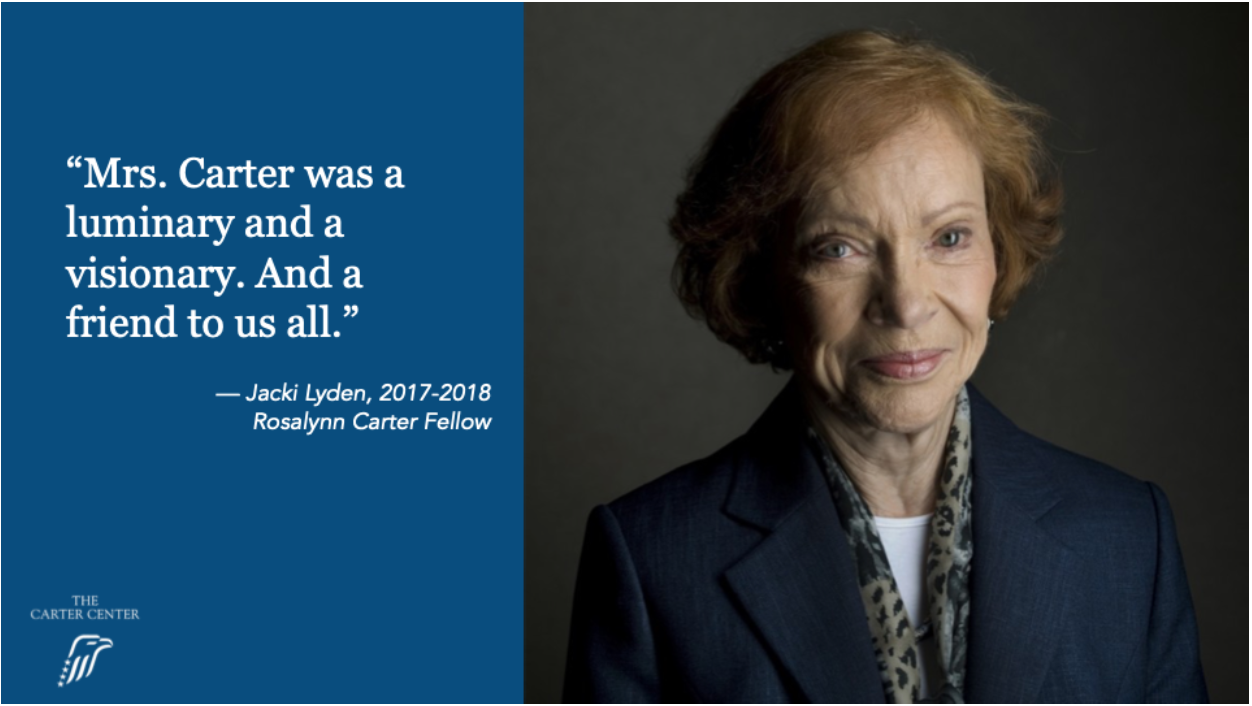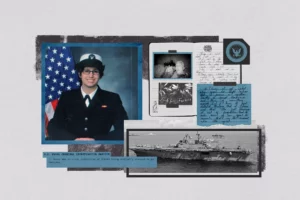
‘A friend to us all’: Rosalynn Carter is remembered fondly by her namesake Fellows
Former First Lady Rosalynn Carter, the founder and namesake of the Rosalynn Carter Fellowships for Mental Health Journalism, passed away on November 19, 2023. She was 96.
Not long after, the Carter family issued a statement sharing that, “Rosalynn Carter’s deep compassion for people everywhere and her untiring strength on their behalf touched lives around the world. We have heard from thousands of you since her passing.”
Among those tributes are emails and social media posts from the hundreds of journalists who have been part of the Rosalynn Carter Fellowships for Mental Health Journalism. The program, which began in 1996, has awarded fellowships and provided mental health reporting training to more than 250 journalists around the U.S. and world. Participants throughout the years — from Fellows who were selected more than two decades ago to those who were awarded the fellowship just this year — soon began sharing their remembrances of Mrs. Carter and how her fellowship program forever impacted their lives and careers.
Here are some of the messages we received:
Gregory Warner, a 2007-2008 Rosalynn Carter Fellow and host of NPR’s Rough Translation, recalled meeting Mrs. Carter “after landing in Atlanta from Afghanistan, trying to make sense of a country where people were so scarred by war but where the labels I knew of — PTSD, etc — just did not seem to apply.”
“Mrs. Carter immediately grasped that,” Warner continued. “She was an advocate not just for people with mental illness but for the kind of empathy and deep listening that goes beyond our limits to diagnose. I’m proud to have met her and to be part of this group that’s kept her legacy alive and ablaze.”
Mexican journalist Miriam Vidal Valero shares that pride. As a member of the 2020-2021 fellowship cohort, Valero didn’t get to meet Mrs. Carter in person, but she still felt her impact. “I feel very fortunate to have had the opportunity to get to know her and improve my work through the mentors and colleagues I met in the program,” Valero said. “I know I was part of something special, all thanks to her. She will be missed and remembered forever.”
Lee Hawkins, a member of the 2023-2024 Fellowship cohort, shared a powerful tribute to the Former First Lady on his LinkedIn profile. “In honor of Mrs. Carter, I pledge to continue her work with the same passion she exemplified,” he wrote. “Her advocacy for mental health has led to significant advancements in the field and her belief in compassion and understanding has transformed lives.”
Mrs. Carter’s “legacy will live on in those she touched and her impact on mental health will be felt for generations,” Hawkins added.
For Claire Keeton, a South African journalist and 2004-2005 Fellow, “the profound effect” of her fellowship and meeting Mrs. Carter and other leaders in mental health have influenced her work for decades. In November, Keeton won a major national award for her reporting on bipolar disorder and living with long Covid.
“My commitment to covering mental health, which deepened during my fellowship, is stronger than ever,” she said. “I remain deeply grateful.”
Tanya Ott will never forget the moment she met Mrs. Carter. She arrived at The Carter Center for the annual fellowship meeting on September 11, 2001. “I was terrified, having left my three small children back home,” Ott remembered.
“It’s a small moment in the grand scheme, but Mrs. Carter sat with me, asked about my children and, a year later when I returned [to The Carter Center], remembered details about that conversation that truly surprised me,” Ott said. “To spend time with her was to truly feel seen.”
Fellows also published their accounts of meeting and being inspired by Mrs. Carter in several news stories. Soreath Hok published a powerful personal account for WBUR: Rosalynn Carter helped me, and thousands of other Cambodian refugees, survive. On NPR, Aaron Glantz shared that, “Mrs. Carter was the first person to ever ask me how my journalism would make an impact. It was such an obvious question that it changed my life.” Christine Herman was on NPR’s Morning Edition, noting that Mrs. Carter’s legacy on mental health boils down to one word: Hope. Christie Diez shared the story behind The Rosalynn Carter Institute for Caregivers. For Georgia Public Broadcasting, Ellen Eldridge documented Mrs. Carter’s impact on her home state. And on Toronto’s CP24, Bakari Savage reflected on Mrs. Carter’s legacy with The Carter Center’s Dr. Eve Byrd.
Finally, for 2017-2018 alumnus Anne Hillman, the fellowship program changed the direction of her life. After several years of primarily reporting on mental health and social justice issues, Hillman decided in 2023 “to go back to school for social work and pursue a career working with and for people with serious mental health issues.”
“Rosalynn Carter keeps popping up in my school work as we learn about mental health parity and stigma,” Hillman shared. “She, alongside The Carter Center staff, positively affected more lives than she could have ever known.”



